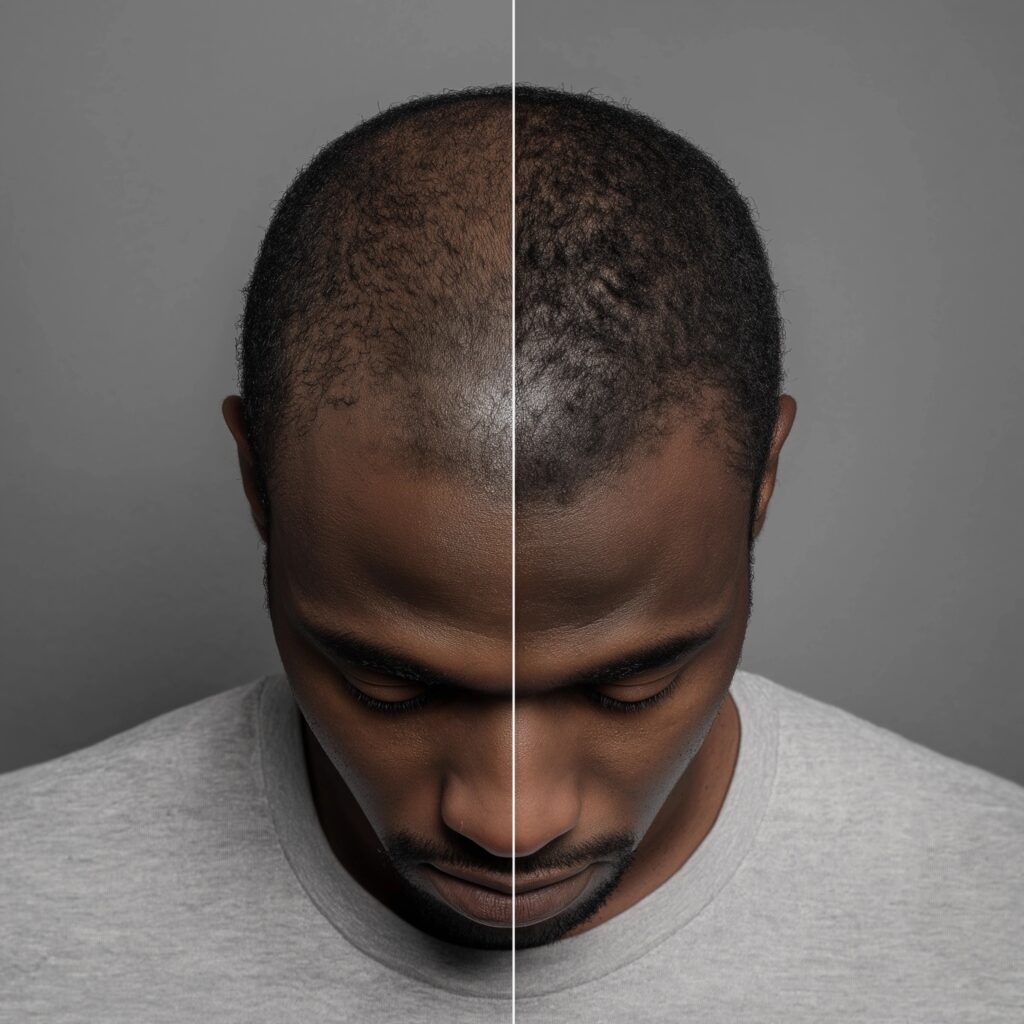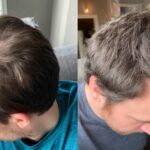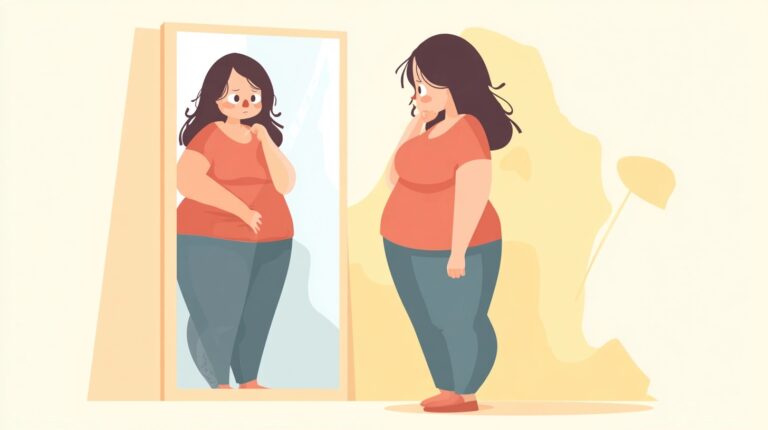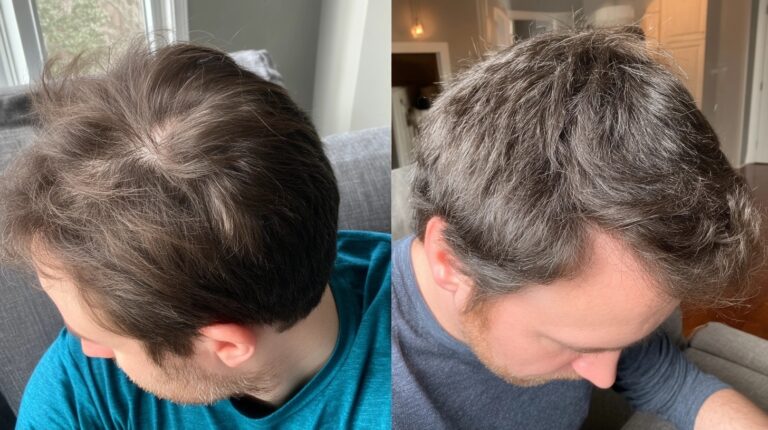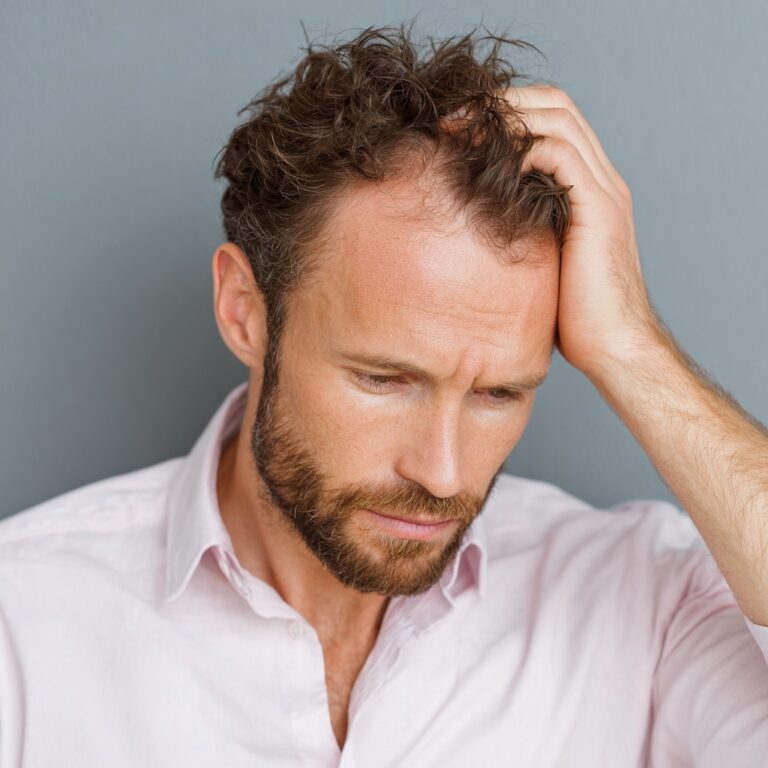Have you noticed more hair in your shower drain lately? Does your hairbrush seem fuller than usual? Are you starting to see your scalp peek through where there used to be thick coverage? If you’re nodding along, the truth might surprise you: hair loss affects approximately 85% of men by age 50 [1], making it a very common concern as one gets older.
Understanding why hair loss occurs is one of the first steps toward addressing it effectively. Excessive hair fall could signal underlying issues that deserve attention. Let’s explore the five key reasons why hair fall might occur in males and what you can do about it.
1. Androgenetic Alopecia (Male Pattern Baldness)
Androgenetic alopecia, commonly known as male pattern baldness (MPB), is responsible for over 30-50% of hair loss in men by 50 [2]. Far from just being a cosmetic concern, this genetically predetermined condition typically manifests as the classic “M” shape, gradually progressing to more extensive baldness [3].
How DHT causes hair loss [2]: At the heart of this genetic hair loss lies a hormone called dihydrotestosterone (DHT). Here’s how it works:
- The conversion process: As an adult, your body converts about 10% of your testosterone (the main androgen) into DHT each day, with the help of an enzyme called 5-alpha reductase (5-AR)
- The hair follicle attack: Once it’s freely flowing through your bloodstream, DHT can then link to receptors on hair follicles in your scalp, causing them to shrink and become less capable of supporting a healthy head of hair
- Genetic sensitivity: It’s not the amount of testosterone or DHT that causes baldness; it’s the sensitivity of your hair follicles. That sensitivity is determined by genetics
What you can do:
- Consult a dermatologist for proper diagnosis using the Norwood-Hamilton scale [1]
- Consider TGA-approved treatments like propecia (finasteride), a 5-alpha-reductase inhibitor that blocks the conversion of testosterone to DHT
- Explore hair transplantation options for advanced cases
Read more: 7 Common Hair Loss Treatments Available in Australia >>
2. Stress (Physical and Emotional)
Stress isn’t just in your head – it’s likely to literally affect your hair too! Telogen effluvium [4] is a type of hair loss that involves rapid shedding of hair over a short period, typically happening a few months after your body goes through something physically or emotionally stressful.
How stress causes hair loss [5]: When you’re under a lot of stress, a large number of hair follicles might prematurely enter their resting state (telogen phase). This often results in noticeable hair loss, especially when you comb or wash your hair.
Common stress triggers include [4]:
- High fever or severe illness
- Major surgery or medical procedures
- Psychological stress and trauma
- Significant life changes (job loss, divorce, death of a loved one)
- Childbirth, severe infections, hyperthyroidism, hypothyroidism
The good news [4] is that hair loss due to telogen effluvium is usually temporary, and your hair might grow back without treatment once you no longer have that stress. Most people see hair regrowth once stress hormones normalize.
What you can do:
- Practice stress-reduction techniques (meditation, yoga, exercise)
- Prioritize 7-9 hours of quality sleep
- Maintain a regular exercise routine
- Consider therapy or counseling for chronic stress
- Build strong social support networks
3. Nutritional Deficiencies
According to research [6], hair follicles are among the most metabolically active in the body, requiring a constant supply of energy and nutrients to function properly. This suggests that hair growth might considerably be impacted by calorie and protein malnutrition as well as micronutrient deficiency.
While significant nutrient deficiencies might harm hair health, there’s little evidence that taking general supplements could help in absence of specific nutrient shortfalls [6]. Hence, instead of relying on expensive vitamin blends (posing toxicity risks if overconsumed), prioritize a balanced diet, ideally under the guidance of your dietitian.
What you can do:
- Eat a balanced diet rich in lean proteins, fruits, and vegetables
- Consider blood testing to identify specific deficiencies
- Supplement only under medical guidance
- Focus on whole foods rather than processed options
4. Medical Conditions (Especially Thyroid Disorders)
Several medical conditions might be able to significantly impact hair growth, with thyroid disorders being among the most underestimated culprits [7]. Unlike other types of baldness, thyroid-related hair loss affects not just your scalp, but also your eyebrows, pubic hair and hair on other parts of your body.
Studies [7] show that both hypothyroidism (underactive thyroid) and hyperthyroidism (overactive thyroid) are associated with hair loss. Thyroid hormones control the growth, differentiation, metabolism, and thermogenesis of body cells, including hair follicles. When hormone levels are imbalanced, this might disrupt the normal hair growth cycle, leading to thinning hair and hair fall.
Other medical conditions causing hair loss:
Medical Conditions | Details |
Autoimmune diseases | Alopecia areata is an autoimmune condition where the body’s immune system attacks healthy tissues, including hair follicles [8] |
Scalp infections | Bacterial or fungal infections may cause temporary localized hair loss [9] |
Hormonal imbalances | Beyond thyroid issues, other endocrine disorders like hyperinsulinemia (high insulin levels) could affect your hair [10] |
Chronic illnesses | Conditions like lupus, diabetes, and heart disease [11] |
When to see your health practitioner:
- Sudden, rapid hair loss
- Patchy hair loss patterns
- Hair loss accompanied by other symptoms (fatigue, weight changes, mood changes)
- Hair loss that doesn’t improve after addressing lifestyle factors like stress or diet
5. Medications and Medical Treatments
Sometimes the medications meant to help you might inadvertently affect your hair growth. Understanding this connection could help you work with your healthcare provider to find adequate solutions.
Here are common medications and medical treatments that may cause hair loss:
- Thyroid medications:
Some people find their hair loss worsens when they start levothyroxine, though this is usually short-lived and occurs because hormones need time to stabilize [12]. Taking too much levothyroxine might lead to a hyperthyroid state and one of the symptoms of hyperthyroidism is hair loss [7,12].
- Other medication categories [11,13]:
- Some medications, including retinoids, beta-blockers, calcium channel blockers, depression medicines and nonsteroidal anti-inflammatory drugs (NSAIDs)
- Blood thinners (like warfarin)
- High blood pressure medications
- Cholesterol-lowering drugs
- Antidepressants
- Medical treatments [13,14]:
- Anagen effluvium is rapid hair loss resulting from medical treatment, such as chemotherapy. These potent and fast-acting medications kill cancer cells, but they may also shut down hair follicle production
- Radiation therapy
- High-dose surgeries or medical procedures
What you can do:
- Never stop medications without consulting your doctor
- Discuss alternative medications if hair loss is severe
- Ask about timing (some medications may be temporarily adjusted)
- Consider preventive measures (like cooling caps during chemotherapy)
- Be patient (after chemotherapy ends, hair usually grows back on its own)
Wrapping It Up!
Hair loss is incredibly common, affecting the vast majority of men at some point in their lives. While androgenetic alopecia remains the primary culprit, stress, nutrition, medical conditions, and medications might all play important roles.
The key takeaway? You’re not powerless against hair loss. By understanding its underlying causes and working closely with your healthcare provider(s), you’ll likely have a much greater possibility of effectively slowing or managing your hair loss.
References
- Men’s Hair Loss. American Hair Loss Association. https://www.americanhairloss.org/mens-hair-loss/
- Androgenetic Alopecia – StatPearls – NCBI Bookshelf.
- Skin Care Research. Skin Care Research. Published April 7, 2025. Accessed July 26, 2025. https://www.skincareresearch.org/active-trials/androgenetic-alopecia-male-pattern-baldness/
- Telogen Effluvium: Symptoms, Causes, Treatment & Regrowth. Cleveland Clinic. Published December 1, 2022. https://my.clevelandclinic.org/health/diseases/24486-telogen-effluvium
- Can stress make you lose your hair? Mayo Clinic. https://www.mayoclinic.org/healthy-lifestyle/stress-management/expert-answers/stress-and-hair-loss/faq-20057820
- Guo EL, Katta R. Diet and hair loss: effects of nutrient deficiency and supplement use. Dermatology practical & conceptual. 2017;7(1):1-10. doi:https://doi.org/10.5826/dpc.0701a01
- Hussein RS, Atia T, Dayel SB, Hussein RS, Atia T, Dayel SB. Impact of Thyroid Dysfunction on Hair Disorders. Cureus. 2023;15(8). doi:https://doi.org/10.7759/cureus.43266
- Alopecia Areata – American Hair Loss Association. American Hair Loss Association. Published February 9, 2024. https://www.americanhairloss.org/types-of-hair-loss/alopecia-areata/
- Infectious Agents – American Hair Loss Association. American Hair Loss Association. Published January 24, 2024. https://www.americanhairloss.org/types-of-hair-loss/infectious-agents/
- Gordon ER, Musleh S, Bordone LA. Treatment of insulin resistance with tirzepatide leading to improvement of hair loss. JAAD Case Reports. 2024;50:123-125. doi:https://doi.org/10.1016/j.jdcr.2024.06.001
- Mayo Clinic. Hair loss – Symptoms and causes. Mayo Clinic. Published 2019. https://www.mayoclinic.org/diseases-conditions/hair-loss/symptoms-causes/syc-20372926
- Levothyroxine sodium tablets, for oral use. Published 2024. https://nctr-crs.fda.gov/fdalabel/services/spl/set-ids/18717e58-89fb-4e2f-93b6-d6ac3e988d37/spl-doc
- Tosi A, Misciali C, Piraccini BM, Peluso AM, Bardazzi F. Drug-induced hair loss and hair growth. Incidence, management and avoidance. Drug Safety. 1994;10(4):310-317. doi:https://doi.org/10.2165/00002018-199410040-00005
- Chemotherapy Induced Alopecia (Anagen Effluvium). Alopecia UK. https://www.alopecia.org.uk/chemotherapy-induced-alopecia-anagen-effluvium

